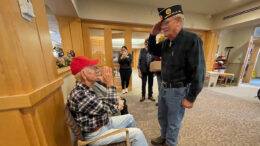Oil City Fire Department Captain Derek Long knows all too well the needs of emergency responders during a crisis.
That’s why he and his fellow firefighters were compelled to do what they could to ensure Oil City schools have the materials they need in the event of an emergency.
The department met its goal of supplying emergency kits to every classroom in the Oil City School District by raising funds with the help of the Veterans of Foreign Wars and the Potter Baseball tour.
The kits include wound-packing gauze, tourniquets, shears and everything needed to treat severe wounds.
Long said supplying the kits was the first phase of a larger plan, with the next step being to provide stop-the-bleed training to students and faculty over the next school year.
“We want to get them prepared, because they are the first line of response in any emergency situation, whether it’s a gunshot, an arm going through a window or a sports injury,” Long said.
The last two phases of the preparedness plan are to build mass casualty kits for fire department paramedics and to provide training for them. Long said about $3,200 was raised, with $2,700 going toward the emergency kits and the rest left to spend on the department.
“We’re going to build our own mass casualty kits for large scale incidents,” Long said. “It’s a backpack filled with equipment to treat multiple casualties, so we can treat as we go.”
Long believes in the importance of being prepared due to mass shooting incidents being reported in all types of environments.
Long recommended that every workplace have stop-the-bleed kits with tourniquets. The tourniquets were discouraged a few decades ago, because it was believed they would increase the risk of losing a limb.
Due to their recent use in wartime, Long said, it is known the risk of limb loss is minimal and the greater risk is bleeding to death.
“Don’t be afraid to use the tourniquet,” he said. “Get the training and use them properly. The risks are nowhere near the benefits.”
Long mentioned he and fellow firefighter Chad Barry have been in emergency services between 25 and 30 years, during which they have learned the importance of being proactive rather than reactive.
“If you’re not prepared for it, it’s going to be a nightmare,” Long said. “I think that if we stay ahead of the power curve, we can take a situation that’s already horrible and make it manageable.”
































